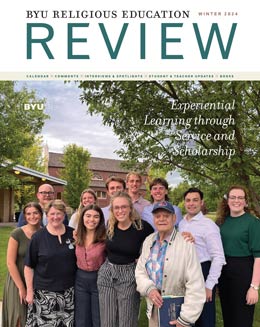Winter 2024 Review Magazine

The Prophetic Purpose of Religious Education
Message from the Deans' Office
In addition to all we can learn from the world’s educational experts, the Church Educational System (CES) enjoys a unique privilege, we receive foundational direction from prophets, seers, and revelators.
This June will mark five years since we received a document from the Church Board of Education entitled Strengthening Religious Education in Institutions of Higher Education (hereafter referred to as SRE). The SRE document is a rare example of a governing board giving such specific attention and directive vision to a single unit at a university. This sends a message that religious education really matters and that the prophets are willing to give us ongoing guidance as they receive direction from the Lord.
While much of the SRE document contains specific instructions for internal faculty hiring and promotion practices, the core of the document defines our central purpose. Note how the SRE’s prophetic purpose statement below aligns with the mission of Jesus Christ and the core aspects of his gospel:
The purpose of religious education is to teach the restored gospel of Jesus Christ from the scriptures and modern prophets in a way that helps each student
- Develop faith in and a testimony of
- Heavenly Father and His “great plan,”
- The Savior, Jesus Christ, and His infinite atoning sacrifice, and
- The restored gospel of Jesus Christ, including The Church of Jesus Christ of Latter-day Saints; the Prophet, Joseph Smith; and the other modern prophets, seers, and revelators.
- Become lifelong disciples of Jesus Christ, who make and keep covenants, who love God and others, and who are able, willing, and committed to gather Israel on both sides of the veil.
- Strengthen their ability to find answers, resolve doubts, respond with faith, and give reason for the hope within them in whatever challenges they may face. [End block quote]
All teaching and scholarship efforts in Religious Education at CES schools are rooted in these stated purposes.
While given specifically to religious educators at CES institutions of higher education, these principles can also be applied to other learning settings in the home and at Church. Great power comes when teachers and students work together to accomplish these inspired outcomes.
Tyler J. Griffin
Associate Dean, BYU Religious Education